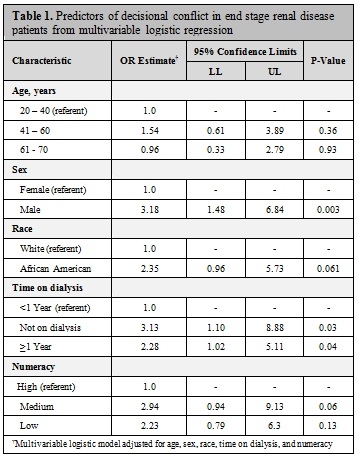Predictors of Patient Uncertainty Regarding Treatment Options Among End Stage Renal Disease Patients Evaluated for Kidney Transplantation.
1Emory University, Atlanta, GA
2Columbia University, New York City, NY
3Northwestern University, Chicago, IL.
Meeting: 2016 American Transplant Congress
Abstract number: 174
Keywords: Kidney transplantation, Patient education, Prediction models
Session Information
Session Name: Concurrent Session: Novel Predictors of Outcome, Big Data and Technology
Session Type: Concurrent Session
Date: Monday, June 13, 2016
Session Time: 2:30pm-4:00pm
 Presentation Time: 3:06pm-3:18pm
Presentation Time: 3:06pm-3:18pm
Location: Room 302
Background: Although kidney transplantation (KTx) provides a significant survival benefit over long-term dialysis, many end stage renal disease (ESRD) patients are uncertain or conflicted about their decision to undergo KTx or remain on dialysis. We aimed to identify predictors of decisional conflict between treatment options in ESRD patients.
Methods: In a randomized clinical trial of ESRD patients (n=158) measuring the effectiveness of a decision tool at a single transplant center, we assessed patient decisional conflict related to KTx through a validated 10-item questionnaire. Scores could range from 0 (none) to 100 (high). Decisional conflict was dichotomized into no decisional conflict (score = 0) and any level of decisional conflict (score > 0). We investigated potential predictors of decisional conflict using univariate and multivariable logistic regression.
Results: The mean age of the cohort was 51 years, with 63% male, and 67% African American patients. More than half (54%) had decisional conflict regarding their treatment. The median time on dialysis at the time of KTx evaluation was 39 months (IQR: 20-127). In univariate analyses, male sex (vs. female OR: 2.5; 95% CI: 1.3, 4.8), black race (vs. white OR: 2.4; 95% CI: 1.2, 4.9), ≥1 year on dialysis (vs. <1 year OR: 2.5; 95% CI: 1.2, 5.1), graduate education (vs. high school OR: 0.3; 95% CI: 0.1, 0.9), and low numeracy (vs. high OR: 2.54; 95% CI: 1.0, 6.3) were independent predictors of decisional conflict. Multivariable logistic regression (Table 1), found age, sex, race, time on dialysis, and numeracy to be moderately good at predicting decisional conflict (c-statistic: 0.74; 95% CI, 0.65, 0.82).
Conclusions: Understanding characteristics that predict decisional conflict in ESRD patients could help identify patients who may require intervention efforts to decrease patient uncertainty about treatment options.

CITATION INFORMATION: McPherson L, Basu M, Pastan S, Mohan S, Wolf M, Gander J, Patzer R. Predictors of Patient Uncertainty Regarding Treatment Options Among End Stage Renal Disease Patients Evaluated for Kidney Transplantation. Am J Transplant. 2016;16 (suppl 3).
To cite this abstract in AMA style:
McPherson L, Basu M, Pastan S, Mohan S, Wolf M, Gander J, Patzer R. Predictors of Patient Uncertainty Regarding Treatment Options Among End Stage Renal Disease Patients Evaluated for Kidney Transplantation. [abstract]. Am J Transplant. 2016; 16 (suppl 3). https://atcmeetingabstracts.com/abstract/predictors-of-patient-uncertainty-regarding-treatment-options-among-end-stage-renal-disease-patients-evaluated-for-kidney-transplantation/. Accessed February 27, 2026.« Back to 2016 American Transplant Congress
